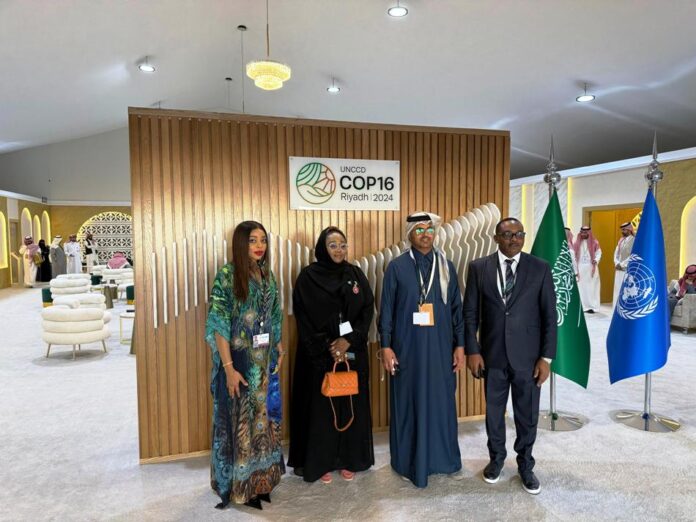The Honourable Minister of Women Affairs, Hajiya Imaan Sulaiman-Ibrahim, has called for the empowerment of women through access to credit, finance, and skills training with a view to ensuring a drastic reduction in environmental degradation.
The Minister made the call Wednesday at the ongoing United Nations Convention to Combat Desertification (UNCCD) COP16 in Riyadh, Saudi Arabia.
She stated that to overcome the challenges of climate change, concerted efforts must be made to provide women with the platforms and tools necessary to participate, contribute, and drive solutions to this global crisis.
Sulaiman-Ibrahim explained that empowering the gender to engage in climate action is essential for fostering innovative solutions and building community resilience because climate change is intrinsically linked to their empowerment.
The Minister informed that women constitute over 50% of the country’s population and are also responsible for more than 70% of agricultural activities, noting that this means we have both the numbers and the willingness to tap into the opportunities provided by the green economy.
Over the past years she said, Nigeria has made significant strides on strengthening the regulatory mechanism, Signing of the Climate Change Bill into law, establishment of the National Council on Climate Change (NCCC), Launch of Nigeria’s Energy Transition Plan as well as Adoption of the Climate Gender Policy to further strengthen the role of Nigerian women in climate action.
Sulaiman-Ibrahim who highlighted the commitment of the President Bola Ahmed Tinubu-led Administration to the fight against climate change, noted that it has among others, established a committee to oversee the Green Economic Initiative with a view to tackling the challenges posed by global warming in the country.
She explained that the economic benefits of investing in the gender as evidenced from various global projects shows that when women are adequately empowered with skills and resources, they invest in ways that enhance food security, increase family income, and foster community resilience.
The Minister informed further that the Ministry, on its part, had put in place a series of strategic initiatives designed to empower women in climate action. These initiatives, she said, include the establishment of a Climate Division within the Ministry to focus on coordinating gender-responsive and age-sensitive climate actions, the introduction of the Women in Green Economy Programme to commence next year, through the involvement of the gender in planting of 10 million economic trees and plants, including Nopal Cactus Cladodes, recognised for their ability to combat desertification as well as improve soil health.
She disclosed that other initiatives include, Empowerment of one million individuals in climate-smart agriculture; Transitioning one million households to clean cooking energy solutions; Supporting 1,000 female-owned startups engaged in climate-friendly businesses; Training 500,000 women in agro-processing techniques; and equipping 2,000 community-based female climate champions for data collection and community sensitisation efforts.
While reaffirming Nigeria’s commitment to climate action, the Minister urged communities, nations, UN agencies, donors, financial institutions, NGOs, and other stakeholders to support the Women in Green Economy programme, which can significantly improve the lives of millions of women and children in Nigeria.
Signed
Mrs. Grace Njoku
Head, Information and Public Relations






